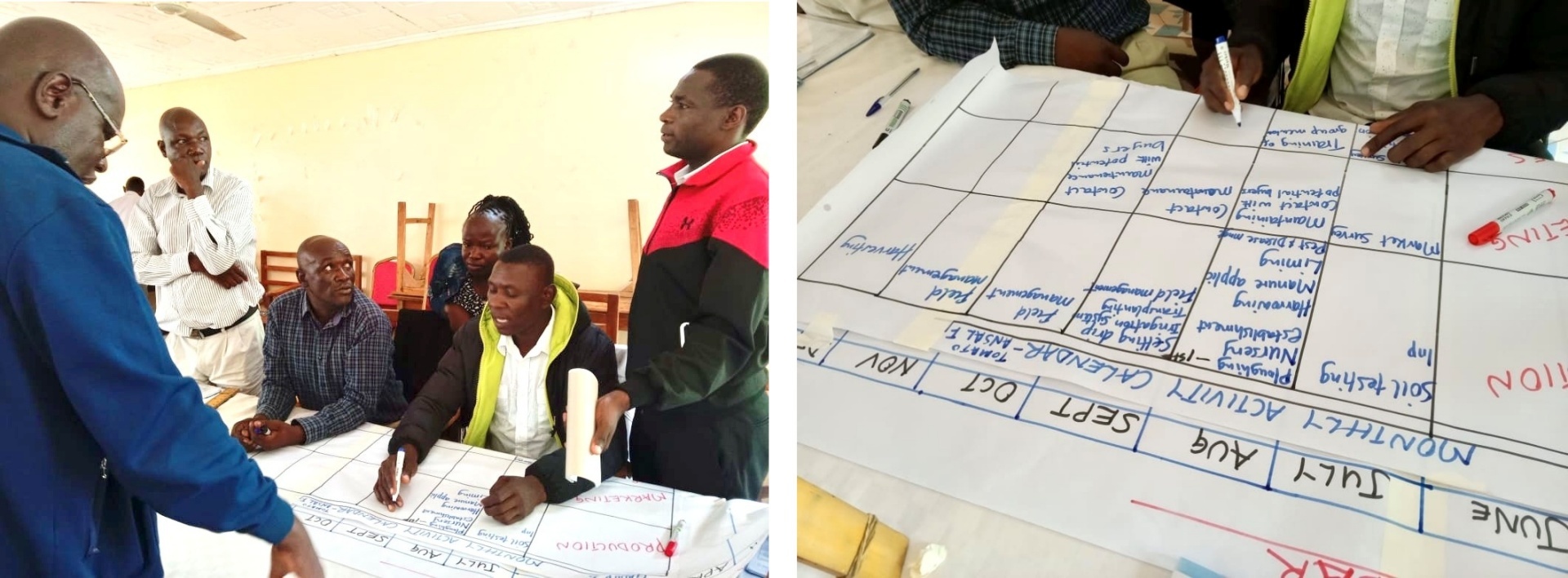Project News Volume 39
I’m a JICA volunteer as a Community Development in Vihiga County, Western Kenya, working in the Agriculture Office.
My main activities include supporting the running of agricultural clubs (4K clubs) in primary schools and supporting farmer groups within my area of responsibility. I heard that many of the JICA volunteers had been involved in agricultural activities using the SHEP approach with children in the 4K clubs. While I had interest in SHEP and I was offered to participate in this training. I was grateful for the opportunity to participate in the training because I was thinking about what I could and should do for children in the primary school and what I could do to support the local farmers.
I participated in the training in Busia where is adjacent to border with Uganda. There were about 30 agricultural extension officers from six sub-counties participating the training. The participants were the mixture of young and old, male and female, and some of officers who had participated in SHEP training in the past.
It was the first time for me to participate in the training where there was only one Japanese among the Kenyans, but what surprised me was that everyone was very vocal about their opinions. When the trainer asked the participants to express their opinions, they expressed their opinions regardless of their bosses, subordinates, gender, etc., and they continued to express their opinions in response.
The four days of training were very enjoyable and meaningful. In particular, I thought I could make use of the market survey and crop calendar making in my future activities.
Until I attended the training, I had simply assumed that, all I had to do was ask for prices in the market survey, and all I had to do was write down what I was going to do until the harvesting month in the crop calendar making. However, the market survey format actually has about 10 items, including production area, quality, peak demand months and payment methods. The officer, who was pretending to be a farmer and asking questions to the market traders, sometimes had a break in the conversation, but by the end of the questioning, he/she was able to continue the conversation with the traders. Seeing this, I thought that a relationship of trust was gradually being built through serious interaction here.
Before conducting our market survey, we heard an interesting story about ‘farmers harvesting green tomatoes’.
This is a story about farmers who harvest unripe tomatoes to increase their yield and improve the surface condition of the tomatoes by exposing them to chemicals and sunlight after harvesting, and traders buy tomatoes that look good and sell them at the market, but the inside is unripe or rotten and the traders lose trust in the market. I had assumed that market survey was only for farmers, but after participating in the training I realised that it is actually also for traders in terms of building trust.

Market survey exercise conducted during the training
After the market survey, the participants presented information on the vegetables they had surveyed, and finally, they created a crop planting calendar. The group also had to come up with a schedule for harvesting at peak times and specify what had to be done before harvesting.
I was reminded that it is not a simple process of planting, fertilizing and harvesting, but that there are many things that need to be done before the harvest.
Some farmers don’t know when plant seeds and some don’t care about the harvest time. This is probably because there are many small-scale farmers in my area of assignment, and most of the harvest is consumed by their own families and they are not particular about quality. They may have enough to eat, but they also need money to pay for their children's school fees. I wanted to use what I learnt from the training in my activities to find out what we should do for farmers, how they can increase their income and how they can produce good quality products.

Crop planting calendar making
During these four days, most of the conversations were in Swahili, which was difficult to understand for me, but the participants were supportive and made the training period a fulfilling one. The group members who greeted me at the end of the training also gave me words of encouragement for my life in Kenya. I am really grateful to the people who treated me so kindly, even though I could not understand their language. Some officers who contacted me after the training even sent me photos showing, they were carrying out activities immediately for the farmer group using what they had learnt. I would like to see them in person if possible.
I would like to support the farmers in my area of responsibility as they did for me.
Now that young people are leaving farming, I think there are challenges to overcome through getting children interested in farming and earning a decent income. I would like to implement the SHEP approach in the 4K club activities and hold workshops, etc., to learn together the enjoy of growing vegetables and the importance of gaining knowledge about business together.
